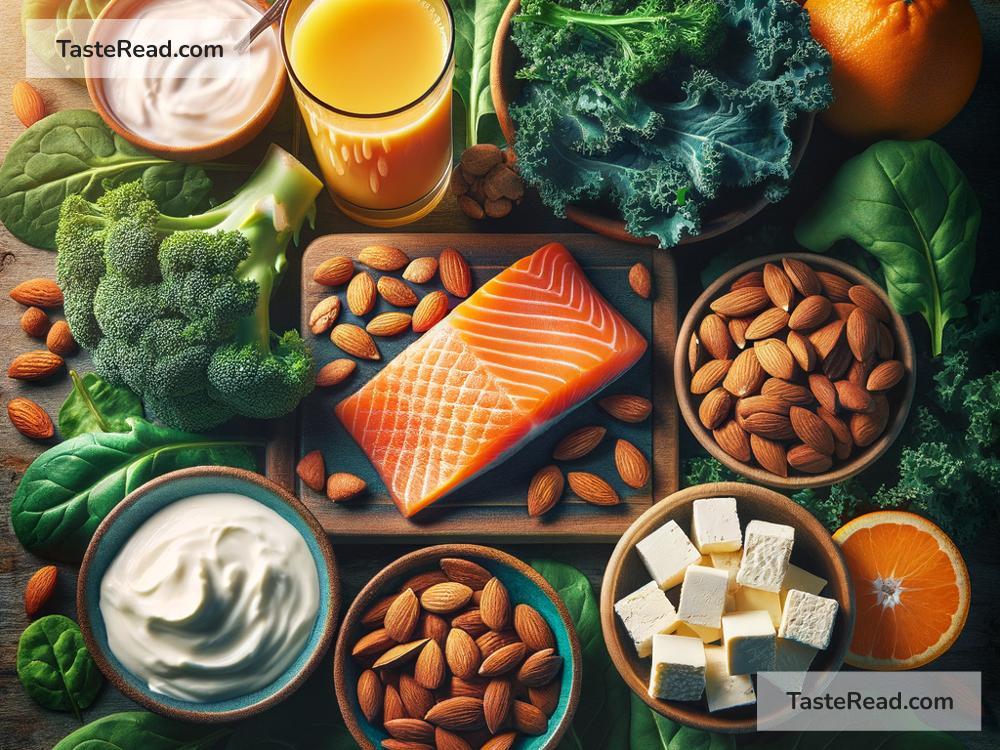Foods That Strengthen Bones: Building a Stronger You
When it comes to staying healthy and active, strong bones play an essential role. They keep your body upright, protect your organs, and support powerful movements, whether you’re dancing, running, or simply walking. However, as we age, our bones can become weaker, leaving us at risk of fractures or conditions like osteoporosis. The good news? Your diet can make a big difference!
Eating specific foods that are rich in nutrients like calcium, vitamin D, magnesium, and protein can help boost your bone health. Here’s a simple guide to the foods that strengthen your bones and why they work.
The Key Nutrients for Healthy Bones
Let’s start with an overview of the nutrients your bones need to stay strong:
- Calcium: Calcium is the most important mineral for your bones. It keeps them strong and dense.
- Vitamin D: This vitamin helps your body absorb calcium more effectively.
- Magnesium: Magnesium assists in converting vitamin D into its active form.
- Protein: Protein gives your bones structure and promotes repair.
- Vitamin K: This vitamin helps improve bone mineral density.
Now, let’s explore foods packed with these bone-strengthening nutrients.
1. Dairy Products: A Calcium Superfood
Milk, cheese, and yogurt are some of the best sources of calcium. Just one glass of milk or a serving of yogurt can offer a large portion of your daily calcium needs. For those who don’t consume dairy or are lactose intolerant, plant-based options like almond milk or soy yogurt (fortified with calcium) are fantastic alternatives.
2. Leafy Green Vegetables: Your Bone’s Best Friend
Vegetables like spinach, kale, collard greens, and broccoli are loaded with calcium, along with magnesium and vitamin K. They are perfect additions to salads, smoothies, or stir-fry dishes. Don’t forget that these vegetables also contain fiber, which helps your digestive system and overall health—another bonus!
3. Fatty Fish: Packed with Vitamin D
Fatty fish, such as salmon, mackerel, sardines, and tuna, are excellent sources of vitamin D. Since vitamin D helps your body absorb calcium more effectively, including these fish in your meals can make a huge impact on your bone health. If you’re not a fan of fish, you can consider cod liver oil supplements.
4. Nuts and Seeds: A Magnesium Boost
Nuts like almonds, peanuts, and walnuts, as well as seeds such as chia and sunflower seeds, are rich in magnesium, which is crucial for activating vitamin D. Snack on a handful of nuts or sprinkle seeds on your salads, oatmeal, or smoothies.
5. Eggs: A Simple Option for Vitamin D
Eggs, particularly the yolk, contain small amounts of vitamin D. While they won’t supply as much vitamin D as fatty fish, they’re an easy and affordable addition to the diet. Start your day with scrambled eggs or a hearty omelet to jumpstart your bone health.
6. Fortified Foods: A Modern Touch
Many everyday products are fortified with calcium and vitamin D to help people meet their nutrient needs. Common fortified foods include breakfast cereals, orange juice, and plant-based milks (like almond milk, oat milk, or soy milk). These options are especially helpful for people who may not get these nutrients naturally through their regular meals.
7. Beans and Lentils: Protein and More
Beans and lentils are packed with protein, magnesium, and phosphorus—all of which contribute to strong bones. Black beans, chickpeas, kidney beans, and lentils make perfect additions to soups, stews, salads, or burritos.
8. Bone Broth: Nourishment for Your Bones
Making broth from animal bones is a time-tested way to extract valuable nutrients like collagen, calcium, and magnesium. Bone broth is easy to make at home and can be sipped as a warm drink or used in cooking soups and sauces.
9. Fresh Fruits: High in Antioxidants
While fruits may not directly contain calcium, many of them (like oranges, strawberries, and pineapples) are rich in vitamin C, which helps your body produce collagen. Collagen is a protein that gives bones flexibility and strength. Eating a colorful variety of fruits each day is good for your bones and overall health.
10. Whole Grains: Phosphorus Support
Whole grains such as oats, quinoa, and brown rice contain phosphorus, a mineral that works alongside calcium to keep bones strong. Replace refined grains like white bread or white rice with these healthier options for better bone health.
Creating a Balanced Meal Plan
To keep your bones strong, aim for variety in your meals and snacks. You can mix and match these foods to ensure you’re getting all the necessary nutrients. Here’s a simple sample meal plan:
- Breakfast: Scrambled eggs with spinach on whole-grain toast.
- Snack: Greek yogurt with fresh strawberries and chia seeds.
- Lunch: Grilled salmon, quinoa, and steamed broccoli.
- Dinner: Lentil soup with a side of kale salad.
Lifestyle Tips for Bone Health
Along with eating the right foods, don’t forget to stay active! Weight-bearing exercises like walking, running, or strength training help strengthen your bones and muscles. Avoid smoking and excessive alcohol consumption, as they can weaken your bones.
Conclusion
Your bones work hard for you every day, so it’s important to keep them strong and healthy by eating right. Incorporating calcium-rich dairy, vitamin D-packed foods, magnesium-loaded nuts, and veggies full of vitamin K into your meals can make a big difference over time. With a balanced diet and healthy lifestyle, you’ll be building a stronger you from the inside out!


